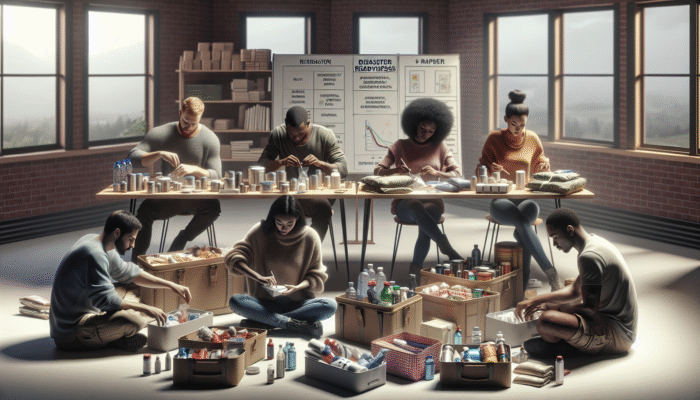Preparedness Tips: Essential Strategies for Readiness
Essential Emergency Preparation Tips for Every Household
Comprehensive Emergency Kit: Essential Items and Maintenance Strategies

A well-equipped emergency kit is crucial for effectively managing unforeseen circumstances. This kit should consist of fundamental supplies such as water, non-perishable food, flashlights, batteries, and a first aid kit. Regular planning and maintenance of your emergency kit are vital, and reviewing its contents every six months is highly recommended. During these evaluations, ensure that all items are within their expiration dates and in optimal condition. Additionally, account for your family’s unique needs, including essential medications or baby food. Including an emergency contact list and a battery-operated radio can also be essential for receiving crucial updates during crises.
All items in your emergency kit should be stored in durable, transportable containers. Options include tactical backpacks or sturdy plastic boxes. The importance of organization cannot be overstated; labeling each compartment of your emergency kit can significantly improve your ability to quickly access the necessary supplies. In an emergency scenario, time is of the essence, and knowing the exact location of every item can be the difference between being prepared and being caught off guard.
Effective Evacuation Plan: Design and Practice for Safety
Creating a detailed evacuation plan is a critical strategy every household should implement. This plan must outline escape routes and designated meeting points to ensure everyone knows where to go in case of evacuation. It’s advisable to draft a map of your home, marking the quickest and safest exits. Moreover, consider the specific needs of all family members, including pets and individuals with disabilities, to ensure everyone can evacuate smoothly.
Regular practice of your evacuation plan is equally important. Conducting drills at least twice a year guarantees that all family members understand how to respond in an emergency. During these drills, evaluate aspects that may require improvement, such as the clarity of escape routes or accessibility to emergency supplies. Engaging all family members, from young children to elderly relatives, fosters a culture of preparation and confidence.
Crisis Communication: Staying Connected During Emergencies
Effective crisis communication is one of the most critical components of emergency preparation. Establishing a clear communication plan helps keep your family connected during emergencies. Designate a contact person outside your immediate area whom everyone can reach out to for updates. This individual should be a friend or relative who resides in a safe zone, away from the affected area.
Furthermore, consider alternative communication methods, such as messaging applications that function without internet connectivity or two-way radios. Ensure that every family member has easy access to important contact numbers, including local emergency services. Having this information readily available can be vital during critical moments. It’s also wise to regularly review and adjust this communication plan to accommodate any changes in family dynamics or contact details.
Emergency Preparedness Tips for Natural Disasters

Earthquake Preparedness: Proactive Measures to Ensure Safety
In regions susceptible to earthquakes, preparation is paramount for minimizing damage and ensuring safety. One of the first steps you should take is to secure heavy furniture and appliances, such as bookshelves and refrigerators, to the walls using straps or brackets to prevent them from tipping over during a quake. Additionally, identify safe zones in each room, such as under sturdy tables or in corners, where you can seek shelter during shaking.
It is equally important to have a specific earthquake action plan. This plan should detail how to respond when ground movement is detected, including the safest places to take cover. Practicing this action plan can enhance the sense of security and preparedness among all household members. Moreover, consider assembling an emergency kit specifically for earthquakes, containing items like water, food, and essential tools.
Hurricane Preparedness: Comprehensive Strategies Before, During, and After the Storm
Preparing for a hurricane necessitates a proactive approach. Prior to the storm’s arrival, it is vital to ensure your home is secured. This includes reinforcing windows and doors, as well as clearing drains and gutters to prevent flooding. Maintain an adequate supply of essential goods, including an emergency kit and a well-thought-out evacuation plan.
During the hurricane, adhere to local authorities’ instructions and stay informed via radio broadcasts or emergency apps. After the storm has passed, assess any damages and seek assistance if necessary. Familiarizing yourself with the resources available in your community, such as shelters and support services, can be crucial for recovering from the event. Education about hurricanes and their potential impacts is an essential aspect of thorough preparation.
Flood Preparedness: Protecting Your Home from Water Damage

Flood preparedness is essential, particularly if you reside in areas vulnerable to flooding. Employ flood barriers, such as sandbags, to safeguard your home’s entrances from water intrusion. Elevating electrical appliances and heating systems can also mitigate the risk of damage. Establishing a clear evacuation plan for your family is imperative in the event of severe flooding.
Additionally, familiarize yourself with local flood alerts and implement a communication strategy that remains effective during emergencies. Maintaining a list of emergency contacts is crucial as well. Proper preparation can significantly reduce the impact of flooding and ensure the safety of everyone in the household.
Financial Preparedness Tips for Emergencies
Emergency Fund: Steps to Create and Sustain It
An established emergency fund is a vital component of your financial preparedness. This fund should be sufficient to cover three to six months of essential expenses. It is advisable to keep these savings in an easily accessible account, such as a high-yield savings account. Not only does this provide a financial cushion during uncertain times, but it also offers peace of mind.
Creating a robust emergency fund requires discipline and strategic planning. A practical way to begin is by setting a monthly savings goal. Automating transfers of a fixed amount to your emergency fund simplifies the process. Furthermore, regularly review and adjust this fund as your financial needs and circumstances evolve.
Insurance Essentials: Identifying and Selecting the Right Types
Having appropriate insurance coverage is a critical aspect of financial preparedness. Understanding various insurance types, such as health, homeowner’s, and auto insurance, enables you to select policies that best meet your unique requirements. It is essential to thoroughly review coverage options and understand what is included and what is not.
When choosing an insurance provider, compare different companies and read user reviews to gauge their reputation. Ensure that the insurance company has strong ratings for customer service and claims handling. Additionally, consulting with a financial advisor can provide personalized insights tailored to your specific situation, ensuring you make informed decisions.
Long-Term Financial Planning: Strategies for Savings and Investments
Engaging in long-term financial planning is essential for securing a stable future. Investing in retirement funds, such as a 401(k) or IRA, can yield substantial benefits over time. Moreover, diversifying your investments is crucial to mitigate risks effectively. Consider creating a balanced portfolio that includes stocks, bonds, and real estate to maximize growth potential.
It’s advisable to review your investment portfolio at least annually and make adjustments as necessary. Staying informed about market trends and economic developments enables you to make educated decisions. Overall, financial preparedness involves not only saving but also making your money work for you in the long run.
Health Preparation Strategies for Emergencies
First Aid Kit Essentials: Must-Have Items for Home Care
A well-stocked first aid kit is essential for managing health-related emergencies at home. This kit should contain items such as bandages, antiseptics, basic medications, and a comprehensive first aid guide. Ensure that your first aid kit is fully stocked and that all family members are aware of its location.
In addition to standard supplies, consider including medications that may be necessary for specific conditions, such as allergies or chronic illnesses. Regularly check and replace expired items to guarantee that your first aid kit is always ready for immediate use. Training in first aid and CPR is also highly recommended to enhance your level of preparedness.
Pandemic Preparedness: Essential Preventive Measures
In the current landscape, pandemic preparedness is more relevant than ever. Maintaining a stockpile of essential supplies, such as masks, sanitizers, and medications, is crucial. Additionally, adhere to public health guidelines, including vaccinations and social distancing measures, to protect yourself and others.
It is advisable to establish a family communication plan that outlines protocols for responding if someone displays symptoms of illness. Education about disease prevention and promoting hygiene practices are key strategies to minimize the risk of transmission. Being proactive and well prepared is essential during health crises.
Healthy Lifestyle Choices: Habits to Prevent Illness
Embracing a healthy lifestyle is one of the best strategies to prepare for illness prevention. This includes maintaining a balanced diet, engaging in regular exercise, and scheduling routine medical check-ups. A diet rich in fruits, vegetables, and whole grains provides essential nutrients for overall health.
Regular physical activity not only enhances physical well-being but also contributes to mental health improvements. Establishing a fitness routine that incorporates both cardiovascular and strength-training exercises can be advantageous. Additionally, tracking your health metrics and making necessary adjustments ensures you remain in optimal shape.
Travel Preparation Tips for Emergencies
Travel Documentation: Essential Items to Carry and Safeguard
Proper travel documentation is one of the most critical aspects of preparation for any journey. Ensure that you carry your passport, visas, and any other necessary documents. Keeping both digital and physical copies of these documents is advisable in case of loss or theft.
Utilize a secure wallet to store your travel documentation, and consider distributing documents across different bags for added security. It’s also beneficial to maintain a list of important contacts and the addresses of embassies or consulates at your destination. Adequate preparation can prevent issues and ensure a smoother travel experience.
Travel Safety: Tips to Avoid Problems on the Road
Prioritizing travel safety is vital for enjoying a hassle-free experience. Research your destination beforehand, and steer clear of areas known for safety concerns. Stay alert and be aware of your surroundings, particularly in crowded settings.
Moreover, exercise caution with your belongings. Use a secure backpack and store valuables in hard-to-reach places. Maintaining a proactive and cautious attitude is essential for preventing risky situations. Preparation not only involves having a travel itinerary but also being ready to manage any unforeseen circumstances.
Emergency Readiness Abroad: Steps to Take When Traveling Overseas
When traveling internationally, it is crucial to know local emergency numbers and have a well-defined evacuation plan. Familiarize yourself with local customs and laws to avoid legal complications. Having appropriate travel insurance is equally important, providing assistance during medical emergencies or trip cancellations.
Additionally, always keep someone informed about your itinerary and plans. This network of support can be invaluable in unexpected situations. Being prepared for emergencies is not just about readiness; it’s also about enjoying your travels safely.
Technology Preparedness Tips for Emergencies
Data Backup: Protecting Your Information Effectively
In today’s digital age, data protection is essential. Utilize cloud storage services and external hard drives to safeguard important files. Ensure that your data is backed up regularly, especially prior to system updates or major changes.
Additionally, organize your files for easy retrieval if you need to restore them. Proper preparation can help you avoid the loss of valuable information. Consider setting up an automatic backup system to further minimize the risk of data loss.
Cybersecurity: Measures to Safeguard Your Online Presence
With the increasing relevance of cybersecurity, it’s vital to install up-to-date antivirus software as a basic measure to protect your personal information. Use strong, unique passwords for each account and change them regularly to enhance security.
Stay informed about the latest cyber threats and educate your family on recognizing suspicious emails or links. Being well prepared in the digital realm not only safeguards your data but also ensures a safer online experience.
Technology Failure Preparedness: Contingency Planning
Technology failures can occur unexpectedly, so having a robust contingency plan is essential. Consider keeping backup devices on hand, such as an extra phone or a mobile hotspot. Additionally, familiarize yourself with data recovery procedures and ensure everyone in your household understands these plans.
Maintaining a proactive approach to technology is crucial. Training on how to handle common failures can make transitions smoother in the event of a problem. Adequate preparation in this area can prevent significant disruptions to your daily life.
Family Preparation Tips for Emergencies
Children’s Readiness: Teaching Kids How to Be Prepared
Educating children about emergency preparedness is vital for instilling a sense of responsibility. Conduct emergency drills and explain to kids what actions to take in various situations. Additionally, prepare emergency backpacks tailored to their needs, including items like toys, clothing, and snacks.
Utilize engaging educational games to teach safety and preparedness concepts. Making this learning interactive can enhance children’s retention of vital information. Preparation is not solely about safety; it also empowers youth to feel secure and prepared for any eventuality.
Senior Care: Tailored Preparation Plans for the Elderly
Preparing for elderly family members requires a thoughtful approach. Develop evacuation plans and communication strategies that take into account their specific needs and limitations. Ensure they have access to necessary medical supplies and specialized assistance if needed.
Moreover, involve seniors in the preparation process. Listening to their concerns and preferences can help create a preparedness plan that is effective for everyone. Open communication and support are essential for ensuring they feel secure and prepared for any emergency.
Pet Preparedness: Safeguarding Our Animal Companions
Don’t forget to include your pets in your emergency preparedness efforts. Assembling a pet emergency kit is essential, containing food, water, medications, and a copy of their medical records. Also, ensure that their identification tags are up to date, and consider microchipping them for added security.
Familiarize your pets with using carriers or harnesses to facilitate their evacuation during emergencies. Involving the entire family in pet preparedness can create a safer and more comfortable environment for everyone.
Frequently Asked Questions (FAQs)
What should I include in my emergency kit?
Your emergency kit should comprise water, non-perishable food, a flashlight, batteries, a first aid kit, and necessary medications. It’s important to regularly check and update these items to ensure they are ready for use.
How often should I practice my evacuation plan?
It is recommended to practice your evacuation plan at least twice a year. Regular drills help ensure that all family members know what to do in case of an emergency.
What is a good amount to save for an emergency fund?
A good rule of thumb is to save enough to cover three to six months of living expenses. This fund should be easily accessible in case of emergencies.
How can I protect my data while traveling?
Utilize cloud backup services and external hard drives to safeguard important files. Always keep copies of essential documents stored securely.
What types of insurance should I consider?
Consider essential insurances such as health, homeowners, and auto insurance. Choose policies that suit your personal needs and circumstances.
How can I prepare my children for emergencies?
Educate children about emergencies through interactive games and regular drills. Prepare emergency backpacks tailored to their needs.
What should I do if my pet gets sick during an emergency?
Always keep a pet emergency kit that includes food, water, medications, and a copy of their medical records. Familiarize yourself with local veterinary services.
What are some key safety tips when traveling?
Research your travel destination, avoid dangerous areas, and keep your belongings secure. Stay alert and be aware of your surroundings.
How can I stay informed during a disaster?
Keep a battery-powered radio or a charged smartphone with emergency apps. Follow local authorities’ instructions and updates.
What should I do if I experience a cyber attack?
Immediately change your passwords, run antivirus scans, and inform your bank if financial information was compromised. Always have a backup plan for your data.



